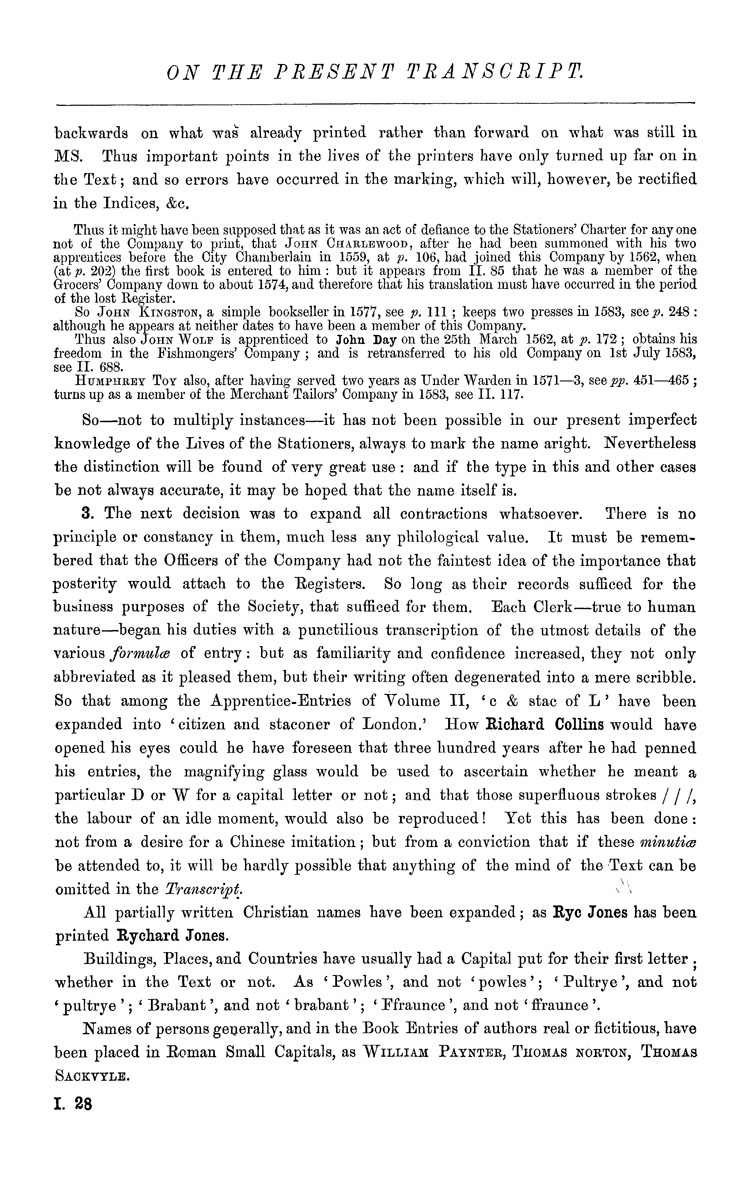ON THE PRESENT TRANSCRIPT
backwards on what was already printed rather than forward on what was still in
MS. Thus important points in the lives of the printers have only turned up far on in
the Text; and so errors have occurred in the marking, which will, however, be rectified
in the Indices, &c.
Thus it might have been supposed that as it was an act of defiance to the Stationers' Charter for any one
not of the Company to print, that John Charlewood, after he had been summoned with his two
apprentices before the City Chamberlain in 1559, at p. 106, had joined this Company by 1562, when
(at p. 202) the first book is entered to him : but it appears from II. 85 that he was a member of the
Grocers' Company down to about 1574, and therefore that his translation must have occurred in the period
of the lost Register.
So John Kingston, a simple bookseller in 1577, see j». Ill ; keeps two presses in 1583, seej9. 248 :
although he appears at neither dates to have been a member of this Company.
Thus also John Wolf is apprenticed to John Day on the 25th March 1562, at i?. 172 ; oDtams ms
freedom in the Fishmongers' Company ; and is retransferred to his old Company on 1st July 1583,
see II. 688.
Humphrey Toy also, after having served two years as Under Warden in 1571—3, see pp. 451—465 ;
turns up as a member of the Merchant Tailors' Company in 1583, see IL 117.
So—not to multiply instances—it has not been possible in our present imperfect
knowledge of the Lives of the Stationers, always to mark the name aright. JSTevertheless
the distinction will be found of very great use : and if the type in this and other cases
be not always accurate, it may be hoped that the name itself is.
3. The next decision was to expand all contractions whatsoever. There is no
principle or constancy in them, much less any philological value. It must be remem¬
bered that the Officers of the Company had not the faintest idea of the importance that
posterity would attach to the Registers. So long as their records sufficed for the
bufciiness purposes of the Society, that sufficed for them. Each Clerk—true to human
nature—began his duties with a punctilious transcription of the utmost details of the
various formulce of entry: but as familiarity and confidence increased, they not only
abbreviated as it pleased them, but their writing often degenerated into a mere scribble.
So that among the Apprentice-Entries of Yolume II, ' c & stac of L ' have been
expanded into * citizen and staconer of London.' How Richard Collins would have
opened his eyes could he have foreseen that three hundred years after he had penned
his entries, the magnifying glass would be used to ascertain whether he meant a
particular D or W for a capital letter or not; and that those superfluous strokes / / /,
the labour of an idle moment, would also be reproduced! Yet this has been done :
not from a desire for a Chinese imitation; but from a conviction that if these minutice
be attended to, it will be hardly possible that anything of the mind of the Text can be
omitted in the Transcript. ^ \
All partially written Christian names have been expanded; as Rye Jones has been
printed Rychard Jones.
Buildings, Places, and Countries have usually had a Capital put for their first letter .
whether in the Text or not. As * Powles', and not ' powles'; * Pultrye', and not
* pultrye '; * Brabant', and not ^ brabant'; * Efraunce ', and not ^ firaunce '.
Names of persons geijerally, and in the Book Entries of authors real or fictitious, have
been placed in Roman Small Capitals, as William Payntee, Thomas Norton, Thomas
Saokvyle.
L 28
|








